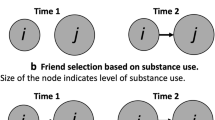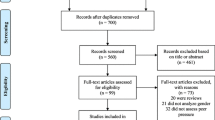Abstract
A panel design with approximately 300 adolescents was employed to investigate the relationship between parental rejection and delinquency. Previous studies have failed to control for potentially confounding family factors and have ignored the possibility that the causal priority is from delinquency to parental rejection, rather than the reverse. Parental rejection continued to show a moderate association with delinquency after relevant controls were introduced. The results were the same across sexes. LISREL was employed to estimate the parameters of the reciprocal relationship between parental rejection and delinquency. Analysis indicated that the predominant causal flow is from parental rejection to delinquency.
Similar content being viewed by others
References
Asher, H. B. (1976).Causal Modeling. Sage, Beverly Hills, CA.
Ainsworth, M. D. S., Blehar, M., Waters, E., and Wall, S. (1978).Patterns of Attachment. Lawrence Erlbaum Associates, NJ.
Andry, R. G. (1960).Delinquency and Parental pathology. Methuen, London.
Bandura, A., and Walters, R. H. (1959).Adolescent Aggression Ronald Press, New York.
Blakely, B., Stephenson, P. S., and Nichol, H. (1974). Social factors compared in a random sample of juvenile delinquents and controls.Int. J. Social Psychiatr., 20: 203–217.
Brown, S. E. (1984). Social class, child maltreatment, and delinquent behavior.Criminology 22: 259–278.
Conger, R. D. (1976). Social control and social learning models of delinquent behavior.Criminology 14: 17–40.
Conger, R. D., McCarthy, J. A., Young, R. K., Lahey, B. B., and Kropp, J. P. (1984). Perception of child, child-rearing values, and emotional distress as mediating links between environmental stressors and observed maternal, behavior.Child Develop. 55: 2234–2247.
Downs, W. D. and Robertson, J. F. (1984). Reliability and validity of the short form of the family environment scale. Paper presented at the National Council on Family Relations.
Elder, G. (1974).Children of the Great Depression. University of Chicago Press, Chicago.
Elifson, K. W., Peterson, D. W., and Hadaway, C. K. (1983). Religiosity and delinquency.Criminology 21: 515–527.
Eron, L. D., Walder, L. O., and Lefkowitz, M. M. (1971).Learning Aggression in Children. Little, Brown, Boston.
Glueck, S., and Glueck, E. (1950).Unraveling Juvenile Delinquency. Harvard University Press, Glueck, S., and Glueck, E. (1950).Unraveling Juvenile Delinquency. Harvard University Press, Cambridge, MA.
Hetherington, E. M., Cox, M., and Cox, R. (1977). The aftermath of divorce. In J. Stevens and M. Mathews (Eds.),Mother-Child, Father-Child Relations. National Association for the Education of Young Children, Washington, D.C.
Hindelang, M. J., Hirschi, T., and Weis, J. G. (1981).Measuring Delinquency. Sage, Beverly Hills, CA.
Hirschi, T. (1969).Causes of Delinquency. University of California, Berkeley, CA.
Hoffman, M. L. (1982). Development of prosocial motivation: Empathy and guilt. In Eisenberg, N. (Ed.),Development of Prosocial Behavior. Academic, New York.
Hunner, R. J., and Walker, Y. E. (Eds.). (1981). Exploring the Relationship between Child Abuse and Delinquency, Allanheld, Osmon, Montclair, N.J.
Imperio, A. M., and Chabot, D. R. (1980). Male delinquents' perceptions of their parents — A factor analysis.Percept. Motor Skills 51: 829–830.
Jacobs, M., Spilken, A., and Noeman, M. (1972). Perception of faulty parent-child relationship and illness behavior.J. Consult. Clin. Psychol. 39: 49–55.
Jensen, G. F. (1972). Parents, peers and delinquent action: A test of the differential association perspective.Am. J. Sociol. 78: 562–575.
Joreskog, K. G., and Sorbom, D. (1978).LISREL IV. National Education Resources, Chicago.
Kenny, D. A. (1979).Collelation and Causality. Wiley, New York.
Kessler, R. C., and Greenberg, D. F. (1981).Linear Panel Analysis: Models of Quantitative Change. Academic, New York.
Lempers, J. D., Clark-Lempers, D., and Simons, R. L. (1988). Economic hardship, parenting practices, and adolescent distress.Child Develop. 60: 25–39.
Loeber, R., and Stouthamer-Loeber, M. (1986). Family factors as correlates and predictors of juvenile conduct problems and delinquency. In Tory, M., and Morris, N. (Eds.),Crime and Justice: An Annual Review, Vol. 7. University of Chicago Press, Chicago.
Long, J. S. (1976). Estimation and hypothesis testing in linear models containing measurement error.Sociol. Methods Res. 5: 157–206.
McCord, J., McCord, W., and Zola, I. K. (1959).Origins of Crime. Columbia University Press, New York.
McCord, J. (1979). Some child-rearing antecedants of criminal behavior in adult men.J. Personal. Social Psychol. 37: 1477–1486.
McCord, J. (1983). A longitudinal study, of aggresison and antisocial behavior. In Van Dusen, K. T., and Mednick, S. A. (Eds.),Prospective Studies of Crime and Delinquency. Kluwer-Nijhoff, Boston.
Mchanahan, S., Wendemeyer, N., and Adelberg, T. (1981). Network structure, social support, and psychological wellbeing in the single-parent family.J. Marriage and Family 43:601–612.
Moos, R. (1974).Family Environment Scale Preliminary Manual. Consulting Psychologists Press, Palo Alto, CA.
Moos, R. (1975).Evaluating Correctional and Community Settings. Wiley, New York.
Nye, F. I. (1958).Family Relationships and Delinquent Behavior. Wiley, New York.
Patterson, G. R. (1982).Coercive Family Process: A Family Learning Approach (Vol. 3). Castalia Publishers, Eugene, OR.
Patterson, G. R. (1986a). Maternal rejection; Determinant or product for deviant behavior? In Hartup, W. W., and Rubin, Z. (Eds.),Relationships and Development. Lawrence Erlbaum, Hillsdale, NJ.
Patterson, G. R. (1986b). Performance models for antisocial boys.Am. Psycholog. 41: 423–444.
Patterson, G. R., and Bank, L. (1987). Some amplifying mechanisms for pathologic processes in families. Paper presented at Minesota Symposium on Child Psychology.
Powell, D. R. (1980). Personal social networks as a focus for primary prevention of child maltreatment.Inf. Ment. Health J. 1:232–239.
Pulkkinen, L. (1983). Search for alternatives to aggression in Finland. In Goldstein, A. P., and Segall, M. (Eds.),Aggression in Global Perspective. Pergamon, New York.
Robbins, L. N. (1966).Deviant Children Grow Up: A Sociological and Psychiatric Study of Sociopathic Personality. Williams and Wilkins, Baltimore, MD.
Robbins, L. N. (1984). The epidemiology of antisocial personality. In Cavenar, J. O. (Ed.),Psychiatry. Lippincott, Phidelphia, PA.
Robertson, J. F., and Simons, R. L. (1988). Family factors, self esteem, and adolescent depression.J. Marriage Family, forthcoming.
Rohner, R. P. (1975).They Love Me, They Love Me Not: A Worldwide Study of the Effects of Parental Acceptance and Rejection. Human Relations Area Files, New Haven, CT.
Rohner, R. P. (1986).The Warmth Dimension: Foundations of Parental Acceptance-Rejection Theory. Sage, Beverly Hills, CA.
Rollins, B. C., and Thomas, D. L. (1979). Parental support, power, and control techniques in the socialization of children. In Burr, W. R., Hill, R., Nye, F. I., and Reiss, I. L. (Eds.),Contemporary Theories About the Family, Vol. I. Free Press, New York.
Rutter, M. (1972).Maternal Deprivation Reassessed. Penguin Books, New York.
Simons, R. L., Conger, R. D., and Whitbeck, L. B. (1988). A multistage, social learning model of the infleunces of family and peers upon adolescent substance use.J. Drug Issues, 18:293–316.
Simons, R. L., Miller, M. G., and Aigner, S. M. (1980). Female delinquency and the traditional theories of deviance: An emperical test.J. Res. Crime Delinq. 17: 42–57.
Simons, R. L., and Robertson, J. F. (1989). The impact of parenting factors, deviant peers, and coping style upon adolescent drug use.Family Relations 38:273–282.
Trainer, P. B. (ed.). 1978.Assessment and Evaluation of Youth Programs. Center for Action Research, Inc., Boulder, CO.
Wilson, J. Q., and Herrnstein, R. H. (1985).Crime and Human Nature. Simon and Schuster, New York.
Author information
Authors and Affiliations
Additional information
Research interests: the etiology of adolescent depression, substance abuse, and delinquency; identification of factors which influence parenting practices.
Research interests: the causes, treatment, and prevention of adolescent depression and substance abuse.
Research interests: causes of adolescent and adult substance abuse; antecedents, and consequences of domestic violence.
Rights and permissions
About this article
Cite this article
Simons, R.L., Robertson, J.F. & Downs, W.R. The nature of the association between parental rejection and delinquent behavior. J Youth Adolescence 18, 297–310 (1988). https://doi.org/10.1007/BF02139043
Received:
Accepted:
Issue Date:
DOI: https://doi.org/10.1007/BF02139043




